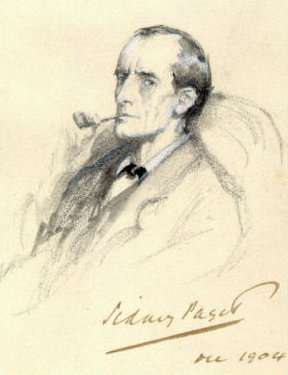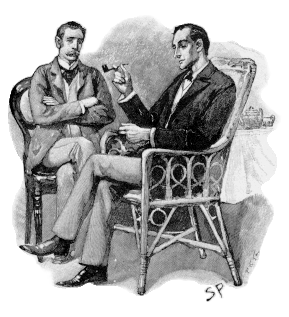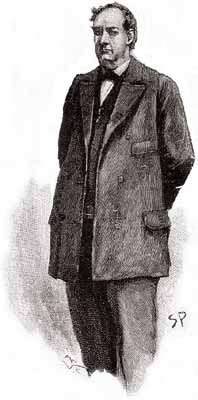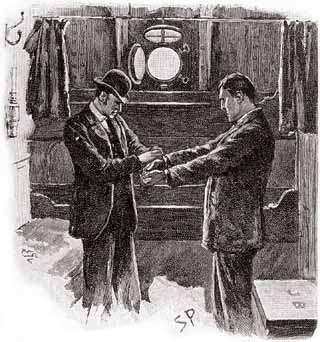< Sherlock Holmes (novel)




Sherlock Holmes (novel)/Characters
Sherlock Holmes

The titular character. The archetype for the Private Detective.
Tropes exhibited by this character include:
- Asexuality: He didn't seem to have the slightest interest in any form of sexual activity or orientation. In fact, as Watson remarks, he rarely referred to such activity save with "a gibe and a sneer".
- He did, however, get very disgusted by anyone who would harm a woman, ESPECIALLY in a sexual or potentially sexual manner.
- Asshole Victim: While he was perfectly fine with letting the law deal with most criminals, it was no trouble to his conscience to see criminals suffer even worse fates and do nothing to prevent it.
- Awesomeness By Analysis: His stock in trade.
- Badass: He was not the kind of guy you tried to kick the ass of. One idiot tried that, and in the words of Holmes, he was sent home in a cart.
- Badass Bookworm: Ironically, his knowledge of literature was rather narrow, though he did favor many book-related intellectual pursuits.
- Bash Brothers: Rarely, but when Holmes needed a fighting buddy, Watson was one of his most frequent.
- Retired Badass: By 1914, he's 60 years old and still got it.
- Berserk Button He had a few. One, he HATED anyone who blackmailed or otherwise took advantage of another person in a similar manner. Second, trying to hurt Watson in any way was one of the few things that would drive him to kill in cold blood, by his own admission. Finally, don't compare him to any other detective.
- Bunny Ears Lawyer: Despite his numerous quirks, he generally came off as more competent because of them than in spite of them. The police force generally regarded him as a bit odd but came to acknowledge he was certainly leagues ahead of them in forensic brilliance.
- Cane Fu: He was certainly handy using one as a weapon, and if he's to be believed, he used a Japanese form of cane fighting to escape certain death at one point.
- Cloudcuckoolander: He was certainly an odd bird at times. As Watson once describes, he was the kind of guy who thought writing the initials of the Queen on his apartment wall with bullet-holes was a perfectly sane idea.
- Cool Old Guy: He was about a decade or so away from this trope in the early stories, entered it towards the later ones, and was definitely this in the very last story he ever appeared in.
- Combat Pragmatism: Was not shy in using unorthodox and even illegal means of winning a fight if he had to.
- Deadpan Snarker: Quite a lot of the time, especially to people he thought especially stupid.
- Detectives Follow Footprints: Holmes made a point of memorizing the various types of dirt around London, to the point he could tell where someone had been by simply examining their toecaps.
- Distinguished Gentleman's Pipe: Noted for using one quite frequently.
- Doesn't Like Guns: Zig Zagged. He wasn't a fan of frequently using them, but he would advise Watson to pack some heat on their more dangerous cases.
- Doing It for the Art: Most of the time. He does take money when he needs repayment for certain expenses related to the case, in which case he averts the trope, but he generally doesn't ask for money upfront.
- He did subvert this once in The Adventure of the Priory School for a very special reason: It was to prove a point to the mastermind of the case, who had initially brought it to Holmes' attention in the first place, that Holmes had every intention of taking him at his word on a reward as warning Holmes knew what he had planned and he would not be entirely off the hook even if he escaped legal trouble.
- Genius Bruiser: Holmes is a genteel man not inclined towards violence, but he's equally capable of using his brains as well as his brawn.
- Godzilla Threshold: He was considered one for bizarre cases the police were stumped by.
- Good Is Not Nice: Holmes could be on the side of the angels and still be a jerk.
- Good Is Not Soft: While he was usually content to just solve a case and let the police handle the rest, if he took a personal interest in a case, he would often prove more deadly to the ambition of the villains than the police.
- Good Old Fisticuffs: Holmes is an accomplished boxer.
- Great Big Book of Everything: Holmes liked to keep track of the people and events to be aware of in his day and age and we see him drawing on his own version of this trope for some cases.
- Heterosexual Life Partners: Watson was closer than blood to Holmes. They were never more than good friends, but Holmes admitted Watson was one of the few he would kill for without hesitation.
- Hyper Awareness: His analysis method is to, as he puts it "not just to see, but also observe". For example, in The Adventure of the Blue Carbuncle, he gives Watson a chance to examine a hat a man lost in a fight, Watson just says it's a dusty old hat. Holmes, by contrast, examined every aspect of the hat and gave Watson a quite accurate description of the man's lifestyle and physical features as could be gleaned from the hat itself, including hairstyle and general age.
- Insufferable Genius: Holmes could be quite the ass about his own genius.
- This does bite him on the ass a few times, which he humbly acknowledges and even asks to be reminded of those times in the future should his ego get too fat again.
- Jerkass: Holmes could be quite the prick when he wanted to be.
- Jerk with a Heart of Gold: That said, even at his worst, he had rock-solid moral principles even he would not deviate from.
- Kick the Son of a Bitch: Why he went so far as to burgle Charles Augustus Milverton. Sure, it was a crime to do so, but as he saw it, it was far less a crime than letting Milverton get away with more blackmail.
- Let Off by the Detective: He was willing to let some sympathetic perpetrators go free at times, and even allowed some not so sympathetic ones to go free if that would have been less likely to have them commit a crime in the future.
- Love Redeems: Holmes lack of sentimentality had one exception: If this trope applied to you and you were the perpetrator of a crime, he would either find a way to keep you from criminal consequences or be willing to speak in your defense.
- The true culprit in the Boscombe Valley Mystery had this as his motive, specifically to prevent the victim of his crime from hurting innocent people. Holmes offered to help him keep the matter silent since the culprit was a dying man unless he had no other means keeping the case under wraps.
- In The Adventure of The Solitary Cyclist, Carruthers one of the people involved in the crime of the story, had a Heel Face Turn as a result of this trope. Holmes was impressed enough by this he offered to speak in the man's defense and the epilouge reveals his sentence was very light by comparison.
- Someone falsely believed to the culprit in The Adventure of the Beryl Coronet became a Silent Scapegoat because of this trope. Holmes even made a point of asking his client to apologize to the party in question because even he was moved by their selflessness.
- Master of Disguise: Holmes was no stranger to costuming himself, often to the point no one could recognize him.
- Moon Logic Puzzle: Holmes could take the most bizarre clues and find a sensible answer with them, though they often turned out far more understandable in hindsight.
- Muscles Are Meaningless: Holmes is a stick figure who has been threatened by guys built like brick shithouses before. He's just as strong as they are regardless.
- To give a good example, in The Adventure of the Speckled Band, Dr. Roylott gets pissed Homes might be meddling in his affairs and threatens him, bending a steel poker to show he could hurt Holmes if he so desired. No sooner does he leave, Holmes takes the same poker, and straightens it back out, which would require MORE strength than what was needed to bend it.
- Nice Hat: Holmes donned a top hat in the city, but he only wore the deerstalker he's more known for in the country.
- No Social Skills: Zig Zagged. He was perfectly capable of showing proper social decorum, he just tended to do otherwise due to a tendency towards Brutal Honesty.
- Oh Crap: Three words. Colonel Sebastian Moran. Holmes doesn't worry about a lot, but that guy even he has a healthy terror of.
- Police Are Useless: Early on, Holmes was convinced of this, but as the police proved far less idiotic, his respect for them increased, and even early on he did acknowledge when some strong hands and backs were needed, the police were the first port of call.
- Private Detective: He preferred "Consulting Detective", which was technically accurate, as he worked for state-sanctioned organizations as well as did private work.
- Roaring Rampage of Revenge: In The Five Orange Pips, when he learns the villains murdered his client, who was completely innocent and had every intention of doing what the villains wanted to prevent his own murder, Holmes is so pissed off he almost starves himself tracking them down so he can turn their own ghastly calling card on them to avenge his client's murder.
- Science Marches On: Some of Holmes' observations were based on phrenology, now a completely discredited pseudoscience in the modern day.
- Screw the Rules, I'm Doing What's Right: Holmes, when given a choice between the law and his own conscience, would choose the latter if the former could not provide what he deemed justice.
- Exemplified in "A Case of Identity", where the villain cannot be LEGALLY punished, but what he did is still despicable, and Holmes nearly beat the shit out of him on the spot to avenge the honor of the victim before he runs away.
- When he couldn't stop Charles Augustus Milverton legally, he decided he'd burgle Milverton's blackmail materials and destroy them since doing things the legal way would not work in time to prevent the blackmailer from ruining another person's life.
- Screw the Rules, I Have Connections: Holmes, if he really needed to, had a lot of friends in high places he could lean on if he needed a favor, including several heads of state. He didn't abuse this often, but if need be he had little shame calling in markers.
- Sherlock Scan: He popularized it, and he often used it to astonish friends and enemies alike.
- Sensitive Guy and Manly Man: Of himself and Watson, he mostly fit the latter, being less emotional and stoic, while not otherwise fitting most depictions of "manly".
- The Slacker: Holmes could be quite lazy in many regards, only averting this when he had work to do. He even chose to rail cocaine when he was really bored out of his mind.
- The Stoner: Holmes would rail cocaine when bored. This was before it was declared a highly illegal drug, but he still acknowledges to Watson it was an unhealthy habit regardless.
- Troll: Holmes was not above trolling people, though many times it was part of a Batman Gambit to smoke out a criminal.
- A notable example is the Norwood Builder adventure, where he trolls both Inspector Lestrade and the true villain of the story at the same time. The former is in good fun, he just wanted to have a bit of fun at Lestrade's expense. As to the latter, he knew it would save an innocent man's life if he trolled the villain in doing what he expected.
- Whip It Good: Holmes often favored a loaded riding crop as a weapon, essentially a horsewhip weighted with a metallic core so it could do considerable blunt force trauma.
Dr. John Watson

Watson shown at left
A former army surgeon, now general practitioner and Holmes biographer and constant ally.
- Anti-Hero: He'd otherwise be a straight-up heroic character if it wasn't for the fact he'd be willing to do some gray area activities, and even outright felonies, but only if in doing so he would serve a higher moral purpose or would help achieve Justice by Other Legal Means if conventional justice just wouldn't help.
- Author Avatar: Of Doyle himself, as Watson was the mouthpiece he told most of the Holmes stories through. The few stories either narrated by Holmes (without Watson present) or done in the third person are especially noticeable as a result.
- Badass: To the point, Holmes, a badass in his own right, came to rely on Watson's regard in this area more than once.
- Badass Bookworm: He is a trained physician, and thus intimately knowledgeable of his profession. Said knowledge proves directly useful in solving a few cases.
- Badass Mustache: Watson had a rather pronounced one, a fact Holmes commented on a few times.
- Bash Brothers: Often accompanied Holmes as combat support, often at the former's request.
- Deadly Doctor: He never killed with his medical technique, as he took his Hippocratic Oath seriously, but he is intimately aware of how his profession could be used to harm as well as heal, and such knowledge allowed him to cotton onto some of the villains who used medical methods to murder or commit a crime.
- Retired Badass: A veteran of Afghanistan.
- Combat Medic: His job in the army was this, and remains both as medical support and combat support to Holmes in many cases.
- Heterosexual Life Partners: Despite his marriage, he was always a close friend of Holmes, a fact his wife even encouraged, as they were good influences on each other, and in some ways, Holmes was ironically responsible for Watson's married happiness. It's worth noting that when Watson's wife passed away, he went back to sharing rooms with Holmes because Holmes knew he would be lonely and needed a friend to avoid dwelling on the sadness.
- Lemony Narrator: Some of Watson's narration tends to skew this way, particularly as it did at the beginning of The Musgrave Ritual, where he practically oozes all kinds of snark over how Holmes was an utter slob while still trying to come off as polite regardless.
- Happily Married: While his wife was alive, that is.
- Herald: As Holmes puts it: "my biographer came to glorify me".
- Hyper Awareness: He eventually picked up a limited version of this after watching Holmes do it for long enough.
- Neat Freak: Admits he wouldn't be considered one, but after dealing with Holmes' even more slovenly habits, he'd be one by comparison.
- Nice Hat: Occasionally donned a top hat.
- Secret Keeper: Holmes implicitly trusted Watson with secrets he would otherwise take to the grave, and if anyone just wanted Holmes' confidence, he made it clear that Watson's confidence was as if it were his own like he told the king of Bohemia:
You may say anything before this gentleman that you may say before me.
- Sensitive Guy and Manly Man: He was the sensitive one between him and Holmes, more prone to emotion and definitely the more sentimental of the two.
- Technical Pacifist: Watson, despite often being armed, rarely actually killed or wounded PEOPLE, but he was prepared to if he had no other choice. He did, however, kill animals that were attacking him or others, and while he rarely was willing to kill or maim without a gun, he would make it clear he would do so if he was given no other choice.
- The Watson: Trope Namer.
Mycroft Holmes

Sherlock's brother. Has an unspecified yet very high place in the British government.
- Brilliant but Lazy: Just as smart as Holmes, could be even better if he applied himself. However, unlike Holmes, doing the legwork was beneath him.
- The Man Behind the Man: For the entire British government. He is literally the one person who can keep the entire bureaucracy of Her Majesty's government straight with only his own mind, and while he will never be officially recognized for his service as a Wetware CPU keeping the British government functioning, he has the pull to bring it to his knees if he really wanted.
- Screw the Rules, I Have Connections: As Holmes implies, Mycroft had the pull to BE the British government in some cases.
- Sherlock Scan: Just as proficient as Holmes in doing this, even one-upping his own brother in The Greek Interpreter.
Inspector Lestrade

Lestrade cuffing a perp.
A recurring Scotland Yard inspector who is both rival and ally to Holmes.
- Failed a Spot Check: Lestrade's biggest flaw as a detective. He was quite good at assembling all the evidence that was present, even managing to piece together most of the case while doing so. Regardless, whenever there was an Absence of Evidence, he didn't factor that in and wonder why that was the case, which is why Homes usually trumped him, as Holmes noticed the not so obvious evidence and filled in the rest of the blanks.
- In The Adventure of the Six Napoleons, Lestrade manages to fill in half the blanks on his own, even managing to figure out the identity of the perp and part of his motives, but it's the evidence he didn't have, or rather, which he overlooked since it seemed a dead-end that Homes followed upon, and that angle unveiled the full scope of the perpetrator's motives.
- This was inverted in The Adventure of the Norwood Builder, where Lestrade was drowning in a ton of open-shut case evidence, and when he discovered a bloody fingerprint that matched the likely suspect, Lestrade just considered it a cherry on top. Holmes, however, realized in taking that as further proof he was right, Lestrade played the trope straight by failing to remember the bloody fingerprint hadn't been at the scene when they first sussed it out. It's this revelation that leads Holmes to realize the truth: the real perp invented all the clues used to frame the wrong man, and he overplayed his hand with the fingerprint, which he planted to ensure the wrong man would hang. Holmes manages to correct Lestrade's oversight just in time, and the latter is quite peeved when he realizes the real perp almost got him to escort an innocent man to the gallows in his place.
- Friend on the Force: Whenever Homes needed cuffs on a perp, Lestrade was frequently called to take out the trash, which the latter was more than happy to assist with.
- Police Are Useless: The man approached downright idiocy when we first met him in A Study in Scarlet, coming to dumb conclusions basically pulled out of his ass. Later, he Took a Level in Badass intellectually, and while not being at Holmes' level, he proved far more competent at his profession.
- The Lestrade: Trope Namer
- Took a Level in Badass: In the very first story, A Study In Scarlet, Lestrade was, to be frank, utterly incompetent and Holmes made a fool of him while barely trying. Fast forward to The Adventure of the Norwood Builder, and not only does he have enough starch in his spine to argue down Holmes' conclusions, he very nearly got Holmes to admit defeat.
Tobias Gregson
Another police inspector like Lestrade.
Professor James Moriarty
One of Homes most deadly enemies and one of the most devious criminal masterminds in all London.
- Badass: Nearly managed to kill Holmes with his bare hands.
- Big Bad: Serves as one for all the crime in England. Even posthumously, his shadow still looms over the crime in the series.
- Shadow Dictator: Of the British criminal underworld.
- Show The Forehead: One of his most prominent attributes.
- Villain with Good Publicity: He's a respected professor who is incredibly adept at leaving a clean trail so that no crime can be linked to him.
- Thanatos Gambit: In The Return of Sherlock Holmes, we learn he planned one in the event he died to ensure Holmes would be a dead man.
Colonel Sebastian Moran
- Badass: SHERLOCK HOLMES was scared shitless of this guy.
- Colonel Badass: His rank in Her Majesty's armed forces.
- Determinator: This man chased Holmes through 3 countries and only stopped chasing him when he ran low on funds to do so.
- Complete Monster: Discussed. Holmes remarks he was once an honorable soldier, but a predilection for his darker impulses eventually overcame whatever goodness he once had and he became a hired killer on Moriarty's payroll once his conversion to this trope was complete.
- Nerves of Steel: It's mentioned how he crawled into a well to take out a wounded man eating tiger, a feat everyone else around him noped right out of getting near.
- Trick Shot Puzzle: He uses a unique air-powered gun that fires soft revolver rounds with the range of a rifle. This utterly baffles investigators in The Adventure of the Empty House.
This article is issued from Allthetropes. The text is licensed under Creative Commons - Attribution - Sharealike. Additional terms may apply for the media files.